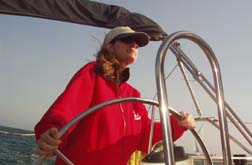
|
Commissions
|
Quick links on this page |
There are plenty of reasons to commission a new piece of music. Let's look at the obvious ones first: You become the hero who is responsible for a sonic contribution to society. Your highest cultural values (and yes, even your ego), are satisfied, as you invest in the future of music and in the artistic legacy of your own era. Your name will live on a score and recording that will be seen around the world. People will think you're cool. You will lose weight, find the love of your life and stop snoring. All because you commissioned a new piece of music. It happens all the time.
|
Alex Shapiro
|
|||
But none of the above is the real reason you should engage me to compose a new piece.
The REAL reason is.... (are you ready? This is the stuff no one talks about)
The reason to commission me is...
...because creating art is incredibly rewarding for everyone involved: the commissioner, the composer, the musicians, and the audiences around the world!
|
|
Life is too short not to have as good a time as possible, and that includes enjoying the process involved in the creation of ART.
Of course I'm going to tell you how much you'll like your new piece. But I'll also tell you that:
|
• You won't lose sleep over whether you'll receive your piece on time, because I work smoothly under deadlines. I'll be the only one who may lose some sleep.
|
|
How does commissioning work?
If you've heard a radio broadcast or attended a concert during which you enjoyed my work, or if you've visited the WORKS page on this site, listened to some brief samples and would like to become a vital part of this artistic process, email me to discuss what kind of piece you would like to commission, what kind of timeline you envision, and what the costs of bringing such a project to life would be.
Whether you're interested in an original piece of music for a private occasion or for a public concert, recording, or media project, the process is an enjoyable one. It is common to schedule the creation of a new work two or more years ahead.
Budgets can be creative and flexible, and are often determined by the nature of the funding source, as well as the instrumentation and scope of the desired project. Payments can be made either at the beginning and the subsequent delivery of the score, or over a longer, predetermined time period. I believe in placing the commissioning process within easy reach of anyone interested; the rewards of such collaboration ring out long after the last note is played.
|
|
It's also possible to bring together a consortium of several musicians, ensembles or patrons to jointly co-commission a work. Each enjoys a dedicated premiere concert and published credit for sponsoring the new piece, while easing the finances of the venture. Consortium commissioning gives a new piece immediate, broad exposure through the performances of many ensembles playing for a wide range of audiences.
Costs vary, and an excellent resource to get a sense of the range can be found in a booklet titled, Commissioning Music: A Basic Guide, which you can download from New Music USA, which offers a helpful guideline here.
Additionally, composer/conductor Dominick DiOrio has written an excellent primer titled, A (Somewhat) Brief Guide To Commissioning New Music, the .pdf of which can be downloaded by clicking here.
If desired, my team can also personally assist with securing a fiscal agent for tax purposes.
|
When a commission comes from a musician or ensemble, collaboration is a very important part of any project. I often include webhearsals into the package, to enjoy the process of connecting with the people bringing the new piece to life.
I often begin by asking what the musicians' needs are: what would contrast well with other pieces on their program? What mood would they like to explore– slow and pensive, a virtuosic program closer, something unexpected and possibly bizarre, or something else entirely? Who's the audience that they're trying to reach? Most commissions leave these decisions up to the composer, but sometimes pieces are commissioned for specific purposes and occasions. My music may still take an unusual approach outside the norm, but it will be fitting: it is entirely possible for an artist to express their unique vision while honoring the spirit of a commission.
I also check with ensemble leaders before adding less common instruments, or deciding that their piece should run a little longer than contracted. I don't think surprises are helpful, and I definitely believe that a composer can take the needs of musicians and listeners into account without ever losing her own musical voice. Respect for this vital triangular relationship is key.
|
|
 |
The
interaction between the composer and commissioner is a wonderful— and very enjoyable— part of the creative process. I love working with clients, and I welcome the opportunity to
dedicate meaningful pieces to musicians and music lovers. The
best way to reach me is through email,
|
|
What's Alex like to work with?
Knowing
a bit about a composer as a person
often adds to the perception of her music.
If you're interested in reading some of my
musings about music, nature and the humor
of life in general,
click
here
|
 |
|
Most of all, you can get an excellent idea about my music and what inspires it by clicking the photo above. Got 36 minutes? Get comfortable, settle in with a beverage, and watch my most personal video to date, thanks to an invitation from Composers Now to join its IMPACT series. Filled with nature and wildlife, puns and pith, and a remarkably broad selection of my music from solo piano to huge electroacoustic ensembles, this multimedia essay premiered August 2, 2022. |
|
And to hear even more: Click below for a head-spinning tour
of some VERY contrasting Shapiro works. One of my favorite comments from listeners is, "some of your pieces don't even sound like they were written by the same person." Yup. Maybe that's why I love to compose: music is the portal through whcih I can share any part of myself, at any time--and maybe show you a little bit of yourself as well in the process!
|
|
What does Alex sound like? Listen in the background as you |
||||
|
|||||
MUSIC FOR LARGE ENSEMBLES: Below is a list of what's on the reel. Click HERE to see the excerpts
|
DOWNLOAD to listen later: |
||||
.WAV (better!) |
.mp3 |
||||
|
|
||||
|
|||||
GO TO |
TITLE |
DIFFICULTY |
||
00:26 |
Grade 4 |
|||
01:09 |
Grade 4+ |
|||
02:32 |
Grade 4 |
|||
03:28 |
Grade 4 |
|||
04:43 |
Grade 5 |
|||
05:42 |
Grade 4+ |
|||
06:40 |
Grade 3 |
|||
07:30 |
Grade 4+ |
|||
08:37 |
Grade 2.5 |
|||
09:30 |
Grade 4+ |
|||
10:54 |
Grade 5 |
|||
11:45 |
Grade 4 |
|||
12:52 |
Grade 5 |
|||
13:35 |
Grade 5 |
|||
15:07 |
Grade 2 |
|||
15:47 |
Grade 4+ |
|||
16:42 |
Grade 3 and beyond |
|||
17:26 |
Grade 0.5 and beyond |
|||
18:04 |
Grade 4+ |
|||
19:06 |
Grade 5 |
|||
20:24 |
Grade 5 |
|||
|
THANKS FOR VISITING MY SONIC WORLD! Drop me an email to say hi and share your world with me, any time.
|
|||||
Contact Info and Press Kit
|
For all licensing and reproduction requests, |
|
Alex is very fortunate to have a fantastic professional associate helping her each day with running her business: meet Laura Krider!
Need assistance with anything from Alex or Activist Music LLC? In addition to always being able to contact Alex, don't hestitate to email Laura. |
Interact with the composer!
|
|